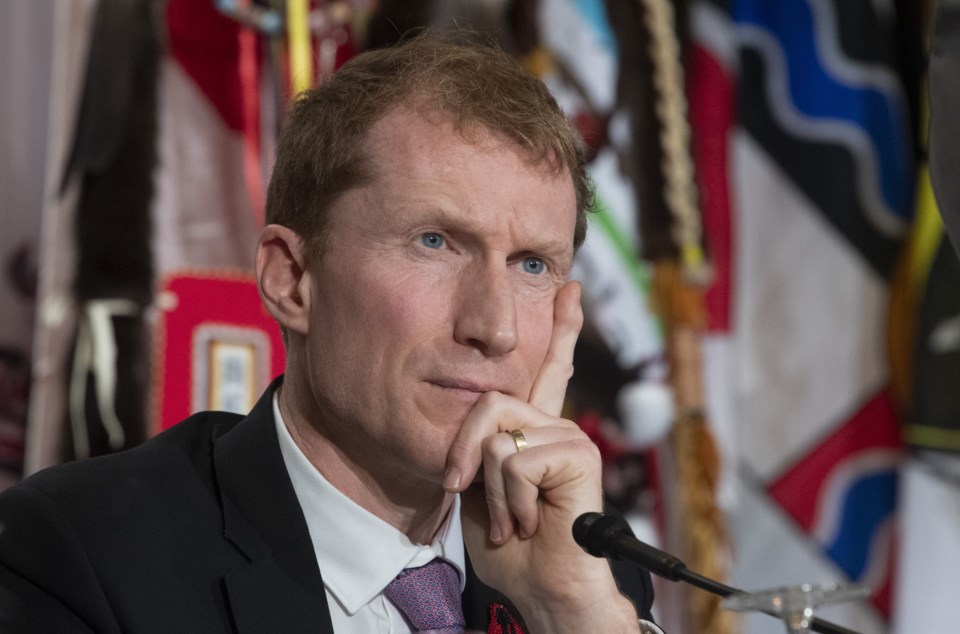Newly minted Indigenous Services Minister Marc Miller is taking over leadership of a department that believes it has made significant progress improving the lives of First Nations, Inuit and Metis people, according to records obtained by Global News.
But officials in Miller’s department also seem to suggest that Ottawa is not getting enough credit for the work it has done on issues such as eliminating boil-water advisories and providing remote Indigenous communities with high-speed internet access. In a document prepared for Miller’s predecessor, Seamus O’Regan, senior Indigenous Services officials said it has been difficult to tell a positive story about its work and partly blamed “fake news and bot accounts [that] spread disinformation on social media.”
The document, prepared in April but obtained by Global News late last month, also warned that “communicating effectively about Indigenous issues can be difficult… complex, subject to different interpretations by different audience, and may lack immediacy for the general public.”
That acknowledgement underlines what will be one of Miller’s trickier challenges: that “the public environment is crowded with other issues, making it challenging to sustain focus on Indigenous concerns.”
The document is a draft presentation deck officials prepared for O’Regan as he prepared to brief a key federal cabinet committee chaired by Prime Minister Justin Trudeau about “results to date and key achievements” by Indigenous Services Canada. The document was obtained through federal access-to-information laws and was moderately redacted by government censors.
The deck is a 46-page list of progress the department believes it has made on everything from eliminating boil-water advisories to building new schools to bringing high-speed Internet services to remote and rural Indigenous communities. O’Regan used a later draft of this deck to brief the Agenda, Results, and Communications Cabinet Committee — often know as the inner cabinet as it is the only one chaired by the prime minister — when it met on April 29.
Indigenous Services Canada – Results To Date and Key Achievements by david_akin on Scribd
The federal government set aside $4.4 billion in the current fiscal year to be spent on a broad range of Indigenous services, part of an overall spend of $21.4 billion over seven years.
“The Liberal government has done more in the last four or five years for First Nations people than anybody else in the last 40 years. But does that mean we’re done? No,” Assembly of First Nations (AFN) National Chief Perry Bellegarde said Tuesday.
Several high-profile persistent problems continue to bedevil the government.
For example, on Tuesday at the AFN’s special assembly of chiefs held in Ottawa, Grassy Narrows First Nation Chief Rudy Turtle pressed the government yet again to fulfill a commitment made two years ago to build a care home in his community for those suffering from mercury poisoning. Without the 24-bed facility, those needing overnight care or outpatient care have to travel six hours to for treatment in Thunder Bay, Ont.
Turtle said talks with O’Regan while he was minister and with Indigenous Services have so far proved fruitless.
“So far this has been going nowhere,” Turtle told reporters. “It’s at a standstill.”
Bellegarde criticized Ottawa for the slow pace of implementing recommendations made by the Missing and Murdered Indigenous Women and Girls Inquiry. “The time for delay and half-hearted piecemeal measures is long past.”
The Trudeau government has also been sharply criticized for appealing a human rights tribunal ruling ordering it to compensate Indigenous children who were inappropriately placed in foster care because of underfunded family services on reserves.
None of those persistent problems were flagged in the unredacted presentation deck released to Global News.
Miller, in his speech to the chiefs’ special assembly Tuesday, recognized that there is much work to do on that file and others.
“We have a lot we promised and a lot we need to deliver,” Miller said. “Canada must — and I will — take responsibility for years of inaction.
At the cabinet meeting on April 29, O’Regan and Crown-Indigenous Relations Minister Carolyn Bennett discussed “key deliverables by end of mandate” — which bureaucrats took to understand as June — but the notes for O’Regan on those ‘deliverables” were prevented from being released by government censors who are allowed, under the law, to withhold records that could be construed as advice to cabinet. Miller was not a member of cabinet at the time.
The inner cabinet’s attention was drawn to the following “key achievements”:
- As of March 5, 81 long-term drinking water advisors were lifted, though 36 were added, leaving 59 to eliminate. Ottawa had completed or was working on 505 water and wastewater projects benefitting 582 communities serving about 458,000 people.
- Ottawa had built or was working on construction of 174 new schools or renovations affecting 224 communities serving about 258,000 people.
- Ottawa had reduced what it calls “the housing gap” by about one-fifth, building or retrofitting 16,074 housing units on reserves versus the 85,000 housing units a 2016 report said were needed on reserves.
- As the health care provider for First Nations communities, Indigenous Services Canada had built or was working on 207 health care facilities in 164 communities serving 176,000 people.
- Global News



